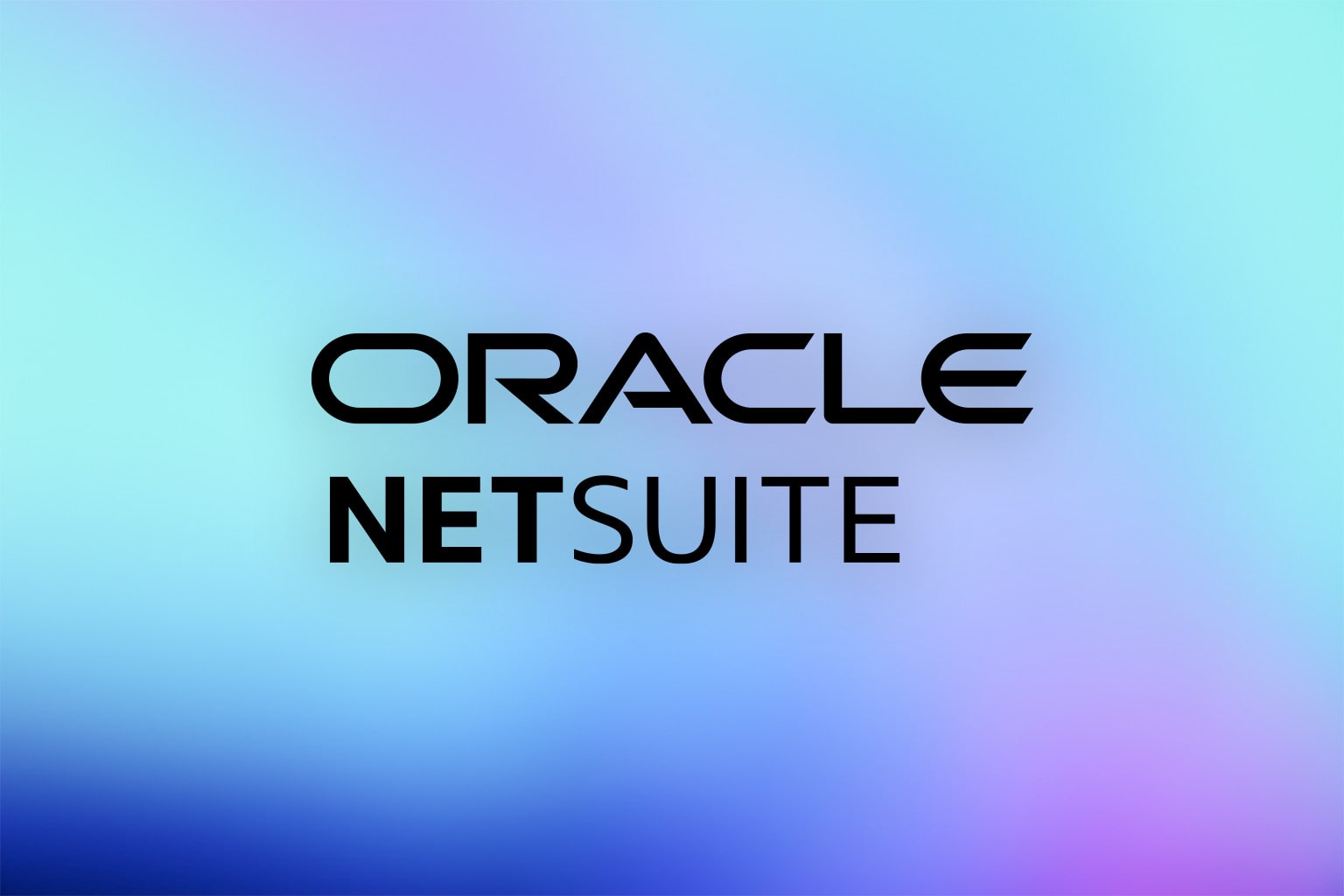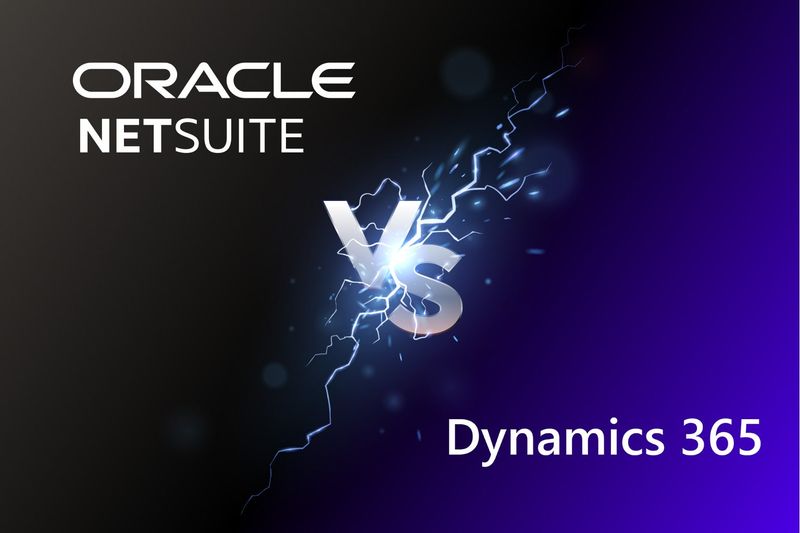Simply put: NetSuite beats Microsoft Dynamics 365 as the best ERP in the market. While both offer comprehensive ERP software, NetSuite wins out with its readily available features, endless customization capabilities, and vast scalability.
Let’s explore the capabilities of NetSuite vs. Microsoft Dynamics 365 to see why NetSuite has a clear advantage.
What’s an ERP?

Enterprise Resource Planning (ERP) is software that organizations use to manage their day-to-day business activities. Activities include accounting, production management, project management, risk management, and compliance, among others.
ERP systems connect various business processes and enable the flow of data between them. By collecting an organization’s shared transactional data from multiple sources, ERP systems eliminate data duplication and provide data integrity with a “single source of truth.”
NetSuite: A Quick Look
NetSuite was founded in 1998 by Evan Goldberg, with substantial funding provided by Larry Ellison, Oracle Corporation’s executive chairman. The company, headquartered in Austin, Texas, is often recognized as the first cloud computing software company.
As it developed, the company expanded its focus to include enterprise resource planning (ERP), propelling it to become one of the leading integrated business software suites. In 2016, Oracle officially acquired NetSuite, merging their resources to serve small to midsize businesses and global enterprises.
Today, NetSuite provides its comprehensive software suite to more than 36,000 customers in 217 countries and territories around the globe.
Microsoft Dynamics 365: A Quick Look
Microsoft Dynamics 365 was first announced in 2016 as a part of Microsoft’s strategy to bring together its complex array of business applications under one unified cloud-based suite. This move was intended to provide an alternative to their overbearing on-premise ERP solutions.
Microsoft Dynamics 365 offers two ERP options: Microsoft Dynamics 365 Finance and Microsoft Dynamics 365 Business Central.
Microsoft Dynamics 365 Finance, as its name suggests, launched in 2016 to offer robust financial management tools. Customers can augment Dynamics 365 Finance with supply chain management, ecommerce, CRM, and other modules. It serves the top end of the midmarket, but only around 3,000 customers use Dynamics 365 Finance.
Microsoft Dynamics 365 Business Central is even newer. Starting in 2108, Business Central combines basic functionalities across finance, sales, customer service, operations, and project management into a single integrated platform. This ERP solution is designed for small and medium-sized enterprises (SMEs).
We’ll tap into both of these Microsoft products to see how they differ from NetSuite in their offerings and functionality.
What is the Market Share of NetSuite vs Dynamics?

NetSuite ERP holds a significant market share of 4.27%, while Microsoft Dynamics 365 Business Central only has 0.91% in the Enterprise Resource Planning (ERP) space.
Key Differences Between Microsoft Dynamics 365 and NetSuite
While NetSuite and Microsoft Dynamics 365 are both sophisticated cloud-based ERP solutions, several key differences set them apart.
In particular, NetSuite’s comprehensive library of features, broad reach to various industries, and system architecture give it a clear advantage over Microsoft Dynamics 365. Here’s how.
NetSuite Has Extensive Prebuilt Functionality
NetSuite is a more complete system out-of-the-box. It includes a robust set of features that streamline implementation, automation, reporting, and configurations. On the other hand, Microsoft Dynamics 365 requires expensive customization and third-party add-ons to achieve the same level of functionality.
In terms of features, NetSuite offers a more extensive range of integrated solutions, including finance, inventory management, order management, CRM, and HR, among others.
NetSuite Has a Broader Scope
NetSuite caters to a broad range of industries and business sizes, while Microsoft Dynamics 365 primarily targets small and medium-sized enterprises.
NetSuite’s comprehensive offerings make it ideal across various industries, including:
- SaaS: NetSuite provides robust subscription management, billing, and financial management features.
- Retail and Wholesale: NetSuite’s integrated retail and wholesale management solutions help businesses manage their inventory, orders, customers, and finances in one place.
- Distribution: NetSuite aids distribution companies in managing their supply chain, warehouse, inventory, and order management processes efficiently.
- Manufacturing: NetSuite offers solutions for demand planning, production management, supply chain management, and more for manufacturers.
- Professional Services: NetSuite includes project management, resource management, time and expense tracking, and billing solutions.
This nimbleness gives NetSuite a leg up on Microsoft Dynamics 365, especially in the ability to scale and adapt to a business’s specific needs and growth potential.
NetSuite Was Born in the Cloud

A key difference between NetSuite and Microsoft 365 Dynamics is their development. NetSuite was designed for a multi-tenant cloud environment from its inception, whereas Microsoft Dynamics 365 was adapted from on-premise software.
The significance here is that NetSuite delivers clean, automatic upgrades twice yearly, ensuring that customers are up-to-date on the latest and greatest features and security enhancements.
Conversely, Microsoft Dynamics 365 outdated system architecture makes it less apt to automatic updates, and it’s not uncommon that customers may be operating the software on versions that are several iterations behind. Without the updated software, customers are at risk of operating on inefficient systems that open them up to security threats.
In-Depth Feature Comparison: NetSuite vs. Microsoft Dynamics 365 Finance
Microsoft Dynamics 365 Finance targets the upper end of the midmarket with a strong focus on finance-centered modules, in addition to others. Here’s how its main features stack up against NetSuite.
Cloud Environment
NetSuite is a true cloud-native solution designed and built specifically for cloud deployment. It operates on a multi-tenant architecture, where multiple customers share the same instance of the software and database infrastructure.
NetSuite comes with semiannual updates, guaranteeing that customers will run the latest, greatest, and most secure software version.
While Dynamics 365 Finance offers cloud deployment, its system architecture is outdated and based on clunky on-premise software. Ultimately, customers are anxious when upgrades finally come around because they fear integrations breaking.
Often, Microsoft Dynamics 365 Finance will skip or hold out on upgrades leaving them vulnerable to security threats and missing out on potentially better features.
Financials
Microsoft Dynamics 365 Finance has a strong foundation for financial management, accounting, reporting, analytics, and automation. However, you’ll need to connect with one of Microsoft’s partners to unlock subscription billing.
NetSuite natively supports subscription billing, including options to extend it with powerful add-ons like Paper Street Agreements that automate subscription agreements, manage complex billing frequencies, and track uncommon contract lengths.
Reporting & Analytics

NetSuite comes out of the box with a more extensive selection of built-in reports and analytics than Microsoft Dynamics 365 Finance. With NetSuite, your admins can hit the ground running with actionable insights and informative dashboards.
Dynamics 365 Finance ships with a default set of reports. However, it demands that customers integrate with highly technical tools like PowerBI or JetReports for additional reporting and data visualization.
NetSuite also has a no-code Saved Search solution, empowering users to run reports and save the results for future reference or add to a dashboard. This time-saving tool can display real-time data and be modified to include or exclude criteria.
You’ll need C# and SQL database developers to pull off something similar in Microsoft Dynamics 365 Finance — adding more staffing pressure and unexpected costs.
Customizations
ERP customization works at two levels: user-friendly out-the-box controls and complex needs. NetSuite elegantly provides solutions for both.
On the one hand, non-technical users can build tailored reports, add custom fields for storing data, and add unique buttons to process information quickly.
When advanced needs arise, developers can customize NetSuite by coding on the tried and true Java-based platform. Over the last two decades, Java has remained a solid and familiar language revered by the developer community.
In contrast, customizing Microsoft Dynamics 365 Finance requires more specialized coding abilities, familiarity with .NET and SQL frameworks, and potentially C# and the older X++. Plus, developers will need to understand older versions of 365 in cases where multiple software versions are running in one business.
Integration Capabilities

Integration capabilities ensure seamless communication between an ERP system and other software solutions used within an organization. NetSuite offers a range of integration features, such as SuiteTalk REST and SOAP web services, CSV file import, high-volume data pipeline, and NetSuite Connector, facilitating continuous data flow between the platform and external applications.
Microsoft Dynamics 365 Finance also provides a variety of integration capabilities, including web services, data integration, and integration with other Microsoft products, as well as connectors to third-party applications.
However, not all Dynamics 365 Finance modules are on the same codebase, including its own CRM product. You must buy Microsoft’s DataVerse middleware to bridge the gap between finance and CRM applications.
NetSuite is constructed on a single codebase, eliminating the need for middleware and providing a more seamless upgrade process.
In-Depth Feature Comparison: NetSuite vs. Microsoft Dynamics 365 Business Central

Microsoft Dynamics 365 Business Central is designed to serve smaller companies. As such, it’s competitively priced, but this comes with several pitfalls. Dynamics 365 Business Central is considerably limited in its ability to scale as companies grow and requires many third-party applications to function at a higher capacity.
Here is a side-by-side comparison of Dynamics 365 Business Central’s features compared to NetSuite.
Cloud Environment
Again, unlike NetSuite’s purely cloud-based pedigree, Microsoft Dynamics 365 Business Central suffers from being built on relics from its on-premises ancestors.
Business Central customers are hesitant to make upgrades (afraid of breaking their current instance), so it’s not uncommon for one business to have multiple versions of the software. Besides incompatibility concerns, holding back system updates exposes users to cybersecurity risks.
Revenue Recognition
Revenue recognition is a crucial financial aspect for many businesses, especially those with subscription-based models. NetSuite supports a range of revenue recognition approaches, such as subscription, fulfillment (quantity or date), and project completion (milestone or percentage). It also offers discrete modules for each revenue stream, allowing for the recognition of various revenues from multiple sources and industries, including US GAAP and IFRS internationally.
Plainly put, Microsoft Dynamics 365 Business Central does not have a comparable revenue recognition capability.
Billing Features

NetSuite offers numerous billing features, such as generating recurring billing schedules, automating recurring invoices and payments, and supporting multiple pricing models. It also offers SuiteBilling to simplify billing operations and provide real-time visibility into billing and financial activity.
Microsoft Dynamics 365 Business Central provides various billing features, such as the capability to generate invoices, manage payments, and monitor customer accounts. However, NetSuite’s more comprehensive billing features make it a more suitable choice for businesses seeking a more comprehensive billing solution.
Consolidating Data
Intercompany consolidation is vital for businesses with multiple subsidiaries, as it allows for the amalgamation of financial statements to provide a comprehensive insight into the financial performance of the entire organization. NetSuite offers intercompany netting, automated intercompany management, and the ability to consolidate both at the subsidiary and parent entity levels.
Microsoft Dynamics 365 Business Central, on the other hand, requires third-party applications to handle consolidations, requiring expensive and sometimes problematic integrations.
Plus, NetSuite is the right choice for businesses requiring a single platform to create multiple custom charts of accounts at the international level. With 365 Business Central, you’ll need middleware to connect separate instances and databases for every location of your business.
Reporting & Analytics
In the realm of reporting and analytics, NetSuite again outshines Microsoft Dynamics 365 Business Central.
NetSuite offers various reporting tools, including flexible querying tools, role-based dashboards, operational reports, KPIs, and the ability to analyze data. Additionally, interactive analytics in the form of maps and charts are available, and users can export saved search and report results as Tableau workbooks.
Microsoft Dynamics 365 Business Central provides some reporting capabilities but requires integration with external tools like PowerBI or JetReports for additional functionality, adding extra maintenance and cost.
Customizations

NetSuite offers a more flexible approach to customization compared to Microsoft Dynamics 365 Business Central.
NetSuite provides user-friendly, point-and-click tools for customizing and configuring the platform in accordance with employee preferences and localization settings. At the same time, Microsoft Dynamics 365 Business Central requires additional technical assistance and customization to fulfill specific requirements.
CRM
NetSuite and Microsoft Dynamics 365 both have access to CRM modules to help manage sales, marketing, lead generation, and customer service. However, NetSuite provides more comprehensive CRM capabilities, including features for sales force automation, marketing automation, customer service, and more.
To fully leverage CRM capabilities, Dynamics Business Central customers must rely on outside modules requiring Dataverse connections, further adding to time and cost.
Implementation Methodology
NetSuite’s implementation methodology, SuiteSuccess, and Solution Provider professionals, offer a streamlined fixed-fee approach to implementing and configuring the platform. Customers get up and running quickly with sound implementation processes, careful training, and ongoing support.
Microsoft Dynamics 365 Business Central implementation, on the other hand, requires a more complex process, heavily relying on the guidance and support of Microsoft partners. The varied mix of implementation practices results in fractured approaches, deprecated methodologies, and increased billable hours.
This difference in support and partner networks can impact the overall success and ease of implementation, making NetSuite an ironclad choice for businesses seeking an easier ERP solution to implement and maintain.
Final Word: NetSuite Wins Over Microsoft Dynamics 365

NetSuite emerges as the clear winner in the battle of NetSuite vs. Microsoft Dynamics 365.
NetSuite’s extensive range of integrated solutions, advanced reporting capabilities, and powerful CRM features make it a highly reliable and future-proof choice for businesses looking to streamline their operations and scale their growth.
For a personalized demo, book a call with our team of passion-driven NetSuite experts. Customer success is our passion; we bring extreme care to align your systems and processes with your company goals.



